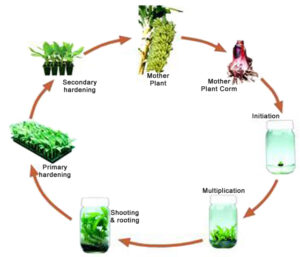
OUR PRODUCTS
Tissue Culture - Banana
 Production Capacity of Tissue Culture Banana in Microsun Bioplants is 10 -15 million plants per year. Microsun Bioplants is supplying Tissue culture Banana plants to the private farmers and Governments of Telangana, Andhra Pradesh, Karnataka, Maharastra, and Chattisgarh.
Production Capacity of Tissue Culture Banana in Microsun Bioplants is 10 -15 million plants per year. Microsun Bioplants is supplying Tissue culture Banana plants to the private farmers and Governments of Telangana, Andhra Pradesh, Karnataka, Maharastra, and Chattisgarh.
Tissue culture is the modern technology that is applied in advanced countries for the mass production of superior-grade planting material for most crops.
Bananas being a crop that is conventionally propagated by vegetative means, can easily be adopted for tissue culturing in a laboratory and the inherent benefits of the system can be successfully employed to fully exploit the economic potential of source of donor or mother plant material which are selected from areas that have recorded disease free cropping several years. From such source, healthy, vigorous, high-yielding donor plants of the desired banana cultivars are identified in the clonal selection process. Meristem tissue which is an actively growing optical portion of bud is teased out from the basal corm of donor plants, surface sterilized, and inoculated to on artificial nutrient media for initiation. Due to rapid cell division in the meristem region, it is devoid of systemic microbes, especially viruses, and viroids.
The initiated tissue, subsequently under a disease-free and controlled environment of a laboratory is multiplied severalfold to obtain the required number of each cultivar depending upon the market demand. Periodically the rooted plantlets of banana are released from the laboratory to a climate-controlled greenhouse for acclimatization, which requires eight to twelve weeks to complete the hardening process. The hardened plantlets will have 5-6 leaves and a well-developed root system at the end of the period.

Production Capacity of Tissue Culture Banana in Microsun Bioplants is 10 -15 million plants per year. Microsun Bioplants is supplying Tissue culture Banana plants to the private farmers and Governments of Telangana, Andhra Pradesh, Karnataka, Maharastra, and Chattisgarh.
Tissue culture is the modern technology that is applied in advanced countries for the mass production of superior-grade planting material for most crops.
Bananas being a crop that is conventionally propagated by vegetative means, can easily be adopted for tissue culturing in a laboratory and the inherent benefits of the system can be successfully employed to fully exploit the economic potential of source of donor or mother plant material which are selected from areas that have recorded disease free cropping several years. From such source, healthy, vigorous, high-yielding donor plants of the desired banana cultivars are identified in the clonal selection process. Meristem tissue which is an actively growing optical portion of bud is teased out from the basal corm of donor plants, surface sterilized, and inoculated to on artificial nutrient media for initiation. Due to rapid cell division in the meristem region, it is devoid of systemic microbes, especially viruses, and viroids.
The initiated tissue, subsequently under a disease-free and controlled environment of a laboratory is multiplied severalfold to obtain the required number of each cultivar depending upon the market demand. Periodically the rooted plantlets of banana are released from the laboratory to a climate-controlled greenhouse for acclimatization, which requires eight to twelve weeks to complete the hardening process. The hardened plantlets will have 5-6 leaves and a well-developed root system at the end of the period.



